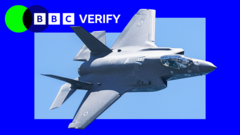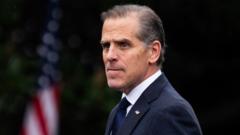The recent meeting follows heightened military escalations, marking an important step towards diplomatic resolution.
**Renewed Diplomatic Efforts on Iran's Nuclear Program Amid Regional Tensions**

**Renewed Diplomatic Efforts on Iran's Nuclear Program Amid Regional Tensions**
Iran engages in significant discussions with E3 nations to revive stalled nuclear negotiations.
In a pivotal diplomatic engagement, Iranian officials met with representatives from the UK, Germany, and France in Istanbul, marking the first negotiations since Israel's military strikes on Iran’s nuclear facilities in June. This conflict initially prompted a 12-day war, during which the United States also targeted several Iranian nuclear sites, abruptly halting US-Iran diplomatic talks concerning nuclear developments.
The European trio, often referred to as the E3, expressed their growing concern, stating that they would consider reimposing sanctions on Iran if a new nuclear agreement is not reached by the end of August. Kazem Gharibabadi, Iran's Deputy Foreign Minister, characterized the discussions as “serious, frank, and detailed,” and reaffirmed a commitment to continued dialogue.
Previously, in 2015, sanctions on Iran’s nuclear program were lifted under the Iran nuclear agreement, which involved negotiations with the US, UK, France, China, Russia, and Germany. Tensions had escalated as the U.S. withdrew support from the agreement in 2018, a move made during then-President Trump’s administration, which many felt inadequately addressed Iran's potential nuclear ambitions. Following this exit, Iran began to exceed the restrictions imposed under the original deal.
The E3 nations have issued warnings about the imposition of strict sanctions if Iran does not curtail its nuclear activities, with a firm deadline approaching in October. During the initiation of talks, Rafael Grossi, the director general of the International Atomic Energy Agency (IAEA), indicated Iran's willingness to engage in technical discussions regarding their nuclear program, stressing the importance of transparency from Tehran.
Amidst these talks, the Iranian foreign ministry asserted that the European countries should rectify their prior unconstructive approaches while accusing them of supporting aggressive actions against Iran. This meeting is set against a backdrop of increasing tensions sparked by military actions from both Israel and the US, which had effectively suspended cooperation with the UN oversight body due to escalating military conflicts.
As provocative incidents unfolded, including missile and drone retaliation from Iran following Israeli airstrikes, this recent round of talks symbolizes a crucial opportunity for all parties to step back from the brink of further military confrontations and strive for diplomacy, with hopes that this dialogue could lead to a more stable regional future.
The European trio, often referred to as the E3, expressed their growing concern, stating that they would consider reimposing sanctions on Iran if a new nuclear agreement is not reached by the end of August. Kazem Gharibabadi, Iran's Deputy Foreign Minister, characterized the discussions as “serious, frank, and detailed,” and reaffirmed a commitment to continued dialogue.
Previously, in 2015, sanctions on Iran’s nuclear program were lifted under the Iran nuclear agreement, which involved negotiations with the US, UK, France, China, Russia, and Germany. Tensions had escalated as the U.S. withdrew support from the agreement in 2018, a move made during then-President Trump’s administration, which many felt inadequately addressed Iran's potential nuclear ambitions. Following this exit, Iran began to exceed the restrictions imposed under the original deal.
The E3 nations have issued warnings about the imposition of strict sanctions if Iran does not curtail its nuclear activities, with a firm deadline approaching in October. During the initiation of talks, Rafael Grossi, the director general of the International Atomic Energy Agency (IAEA), indicated Iran's willingness to engage in technical discussions regarding their nuclear program, stressing the importance of transparency from Tehran.
Amidst these talks, the Iranian foreign ministry asserted that the European countries should rectify their prior unconstructive approaches while accusing them of supporting aggressive actions against Iran. This meeting is set against a backdrop of increasing tensions sparked by military actions from both Israel and the US, which had effectively suspended cooperation with the UN oversight body due to escalating military conflicts.
As provocative incidents unfolded, including missile and drone retaliation from Iran following Israeli airstrikes, this recent round of talks symbolizes a crucial opportunity for all parties to step back from the brink of further military confrontations and strive for diplomacy, with hopes that this dialogue could lead to a more stable regional future.



















